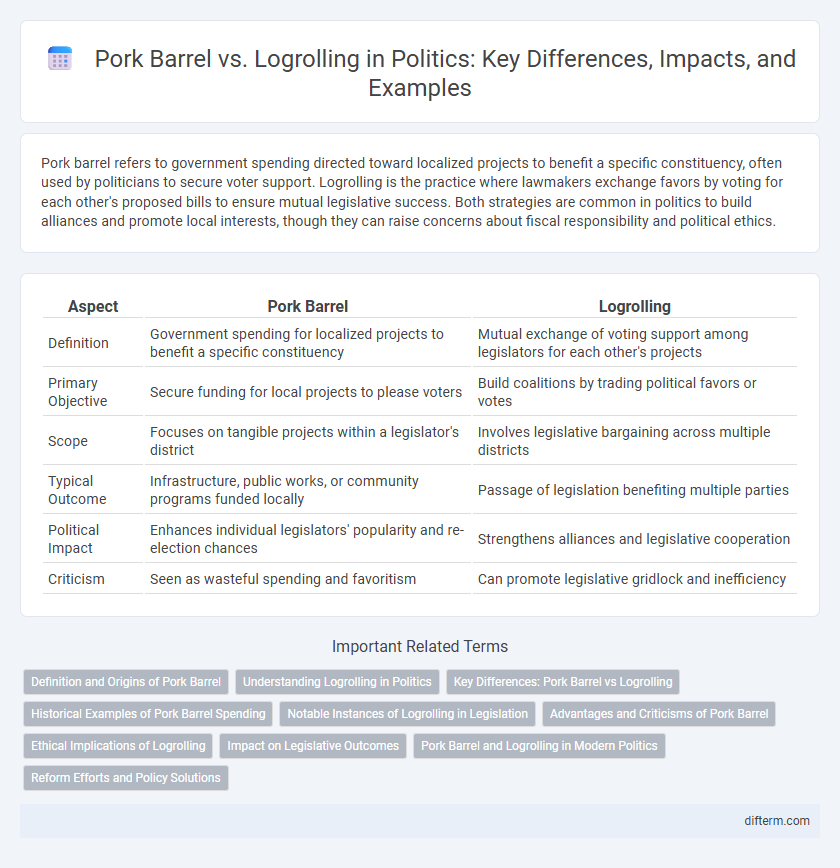Pork barrel refers to government spending directed toward localized projects to benefit a specific constituency, often used by politicians to secure voter support. Logrolling is the practice where lawmakers exchange favors by voting for each other's proposed bills to ensure mutual legislative success. Both strategies are common in politics to build alliances and promote local interests, though they can raise concerns about fiscal responsibility and political ethics.
Table of Comparison
| Aspect | Pork Barrel | Logrolling |
|---|---|---|
| Definition | Government spending for localized projects to benefit a specific constituency | Mutual exchange of voting support among legislators for each other's projects |
| Primary Objective | Secure funding for local projects to please voters | Build coalitions by trading political favors or votes |
| Scope | Focuses on tangible projects within a legislator's district | Involves legislative bargaining across multiple districts |
| Typical Outcome | Infrastructure, public works, or community programs funded locally | Passage of legislation benefiting multiple parties |
| Political Impact | Enhances individual legislators' popularity and re-election chances | Strengthens alliances and legislative cooperation |
| Criticism | Seen as wasteful spending and favoritism | Can promote legislative gridlock and inefficiency |
Definition and Origins of Pork Barrel
Pork barrel refers to government spending aimed at localized projects secured primarily to bring money to a representative's district, often to gain political support. Its origins trace back to early American politics, where political figures would distribute government funds or favors to constituents, resembling the practice of storing pork in barrels. This method contrasts with logrolling, which involves mutual vote trading among legislators to pass each other's proposed bills.
Understanding Logrolling in Politics
Logrolling in politics refers to the practice where legislators exchange support for each other's bills or projects to secure mutual benefits, often leading to the passage of measures favoring specific interests. Unlike pork barrel spending, which involves allocating government funds to local projects primarily to gain electoral support, logrolling is rooted in negotiated cooperation and vote trading among politicians. This strategic collaboration enhances legislative efficiency but may also contribute to policy outcomes driven by political bargaining rather than public interest.
Key Differences: Pork Barrel vs Logrolling
Pork barrel refers to government spending directed to local projects primarily benefiting a legislator's own district to gain voter support, while logrolling involves the exchange of political favors where legislators trade votes to mutually support each other's projects. Pork barrel projects are typically tangible infrastructure or community developments, whereas logrolling is a strategic legislative practice facilitating coalition building and passing broader legislation. Both mechanisms influence budget allocations and policymaking but differ in scope and collaborative intentions.
Historical Examples of Pork Barrel Spending
Pork barrel spending historically appears in projects like the Tennessee Valley Authority, established during the New Deal to boost regional development through federal funds targeting infrastructure and energy. Another example is the Alaska Statehood Act of 1958, where legislators secured earmarks for local projects to gain statehood approval, reflecting pork barrel tactics. These instances underscore how pork barrel spending channels federal dollars into localized projects to garner political support.
Notable Instances of Logrolling in Legislation
Notable instances of logrolling in legislation include the passage of the U.S. Interstate Highway Act of 1956, where lawmakers exchanged support to secure funding for their states' projects. The 1981 U.S. Tax Reform Act also involved extensive logrolling, combining various tax breaks favored by different congressional members to ensure collective approval. These cases highlight how legislative logrolling strategically balances diverse interests to facilitate the enactment of complex bills.
Advantages and Criticisms of Pork Barrel
Pork barrel spending allocates government funds to localized projects that benefit specific constituencies, enhancing legislators' ability to address local needs and secure voter support. Critics argue it fosters inefficiency and corruption by promoting unnecessary or politically motivated projects instead of prioritizing broader national interests. While pork barrel projects stimulate local economies, they often lack transparency and can lead to misallocation of public resources.
Ethical Implications of Logrolling
Logrolling in politics often raises ethical concerns due to the practice of vote trading, which can prioritize political favors over public interest and transparency. This strategic bargaining may lead to the allocation of resources that benefit specific legislators rather than addressing broader societal needs, undermining democratic accountability. The ethical implications include compromising the integrity of legislative decision-making and fostering a culture of quid pro quo that erodes public trust.
Impact on Legislative Outcomes
Pork barrel spending allocates government funds to specific projects benefiting local constituencies, often securing votes by appealing directly to lawmakers' districts, thereby influencing legislative outcomes through targeted financial incentives. Logrolling involves the exchange of support among legislators who agree to back each other's proposed bills, promoting coalition-building that enhances the passage of legislation benefiting multiple parties. Both practices shape legislative decision-making by facilitating compromise and ensuring broader support for bills, but they may also encourage patronage and reduce transparency in the lawmaking process.
Pork Barrel and Logrolling in Modern Politics
Pork barrel spending refers to the allocation of government funds for local projects aimed at pleasing constituents and securing votes, often criticized for fostering inefficiency and corruption. Logrolling, the practice of mutual legislative support where politicians exchange votes for each other's projects, frequently underpins pork barrel politics by enabling the passage of targeted spending. In modern politics, these strategies coexist, influencing budget decisions and legislative priorities while raising concerns about transparency and equitable resource distribution.
Reform Efforts and Policy Solutions
Reform efforts targeting pork barrel spending emphasize transparency and stricter budget oversight to curb misuse of funds and promote equitable resource allocation. Policy solutions advocate for clear criteria and independent evaluation committees to prevent logrolling, ensuring legislative decisions prioritize public interest over reciprocal vote trading. Enhanced accountability mechanisms and digital monitoring platforms also aim to reduce corruption and foster trust in political processes.
pork barrel vs logrolling Infographic

 difterm.com
difterm.com